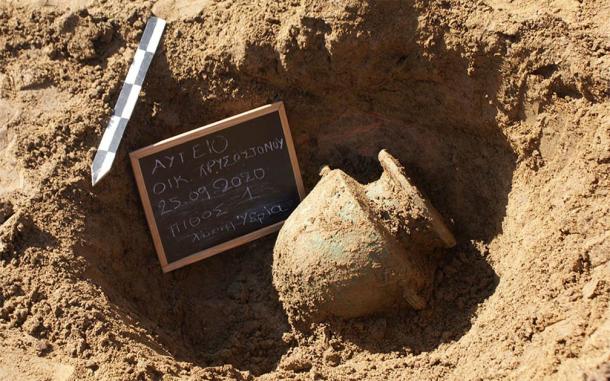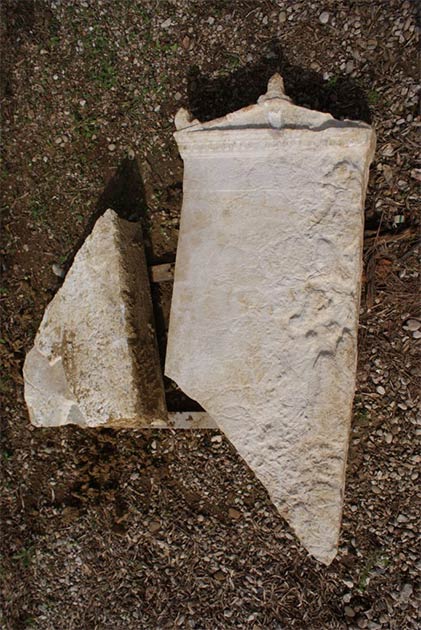Archaeologists in Greece have unearthed eight tombs near the ancient city of Elis. The latest burials unearthed in the Elis necropolis, these burials are helping researchers to better understand the ancient city, which once controlled the holy site of Olympia and managed the Olympic Games .
The tombs were found in Ilia on the Peloponnese peninsula in Southern Greece. They were discovered in a rural area on a piece of land that is privately-owned by the Ephorate of Antiquities of Ilia. They were unearthed during a rescue operation to preserve any historic artifacts and finds before a planned development.

The archaeological dig uncovered a bronze urn within the Elis Necropolis. ( Ephorate of Antiquities of Ilia / Greek Ministry of Culture and Sports)
Important Finds in Ancient Elis Necropolis Tombs
Ekahatimerini.com quotes the Greek Culture Ministry as stating that “the tombs date from the end of the 4th to the 2nd century BC.” They are part of an ancient necropolis, where some 200 tombs have been found dating from the Classical Period and the Hellenistic era. In total eight tombs have been found in the burial area during the recent digs which took place in September.
A burial pit, of a type known as a pithoi, yielded a bronze urn which was on its original base. The Culture Ministry is quoted by Ekahatimerini.com as saying that the urn “has a floral decoration on the handles and lion heads at the junction of the handles with the rim and a bronze folding mirror.” Archaeologists state that they are important finds.
Two other burial pits and four boxed shaped tombs which had been lined with slabs were also unearthed. The eighth burial discovered was “an individual coffin covered by ceramic tiles” states the Greek Reporter . The archaeologists have also retrieved a large number of Hellenistic artifacts from these tombs. Found at the necropolis was a marble tombstone or stele, that is rectangular in shape. This white marble stone is broken but it may be possible to decipher its inscription.

The archaeologists also uncovered a white marble funerary stele within the Elis necropolis. Hopefully they will be able to decipher its inscription. ( Ephorate of Antiquities of Ilia / Greek Ministry of Culture and Sports)
Ancient Elis: The City That Controlled the Olympics
According to Ekahatimerini.com, the Greek Culture Ministry stated that “the tombs were found in the western necropolis of the ancient city of Elis.” This city was also known as Ilia and was an independent city-state in north-west Peloponnese. Encyclopaedia Britannica explains that Ilia was “well known for its horse breeding and for the Olympic Games , which were allegedly founded there in 776 BC.” After a struggle with a neighboring city, it gained control of the sacred sanctuary of Olympia and therefore the Olympic Games, which gave it incredible prestige in the ancient world. This was because Olympia and the games were of great religious and cultural importance in the Hellenic world .
Because of this, it was able to stay independent both from Athens and Sparta. Even after the Romans conquered Greece, Elis was able to maintain a high degree of autonomy and it even prospered, a conclusion reached based on the remains that have been discovered there. With the rise of Christianity, the Olympic Games and Olympia lost their sanctity and prestige, and power of Elis began to decline. It was possibly abandoned sometime after the invasion of Greece by Alaric and his Goths in the 4 th century AD.
The necropolis at Elis is still being excavated and more finds are expected to be made. The burial site is likely to give anthropologists important insights into the past because it contains the final resting places of people from all strata of society, as well as an invaluable glimpse into the evolution of funerary customs and beliefs. The finds from the necropolis are also helping archaeologists to better understand life not just in this important city, but also in classical and Hellenistic Greece.
Top image: Archaeologists have unearthed eight tombs within the Elis Necropolis as part of a rescue excavation in Ilia. Source: Ephorate of Antiquities of Ilia / Greek Ministry of Culture and Sports
By Ed Whelan
Related posts:
Views: 0
 RSS Feed
RSS Feed

















 December 2nd, 2020
December 2nd, 2020  Awake Goy
Awake Goy  Posted in
Posted in  Tags:
Tags: 
















